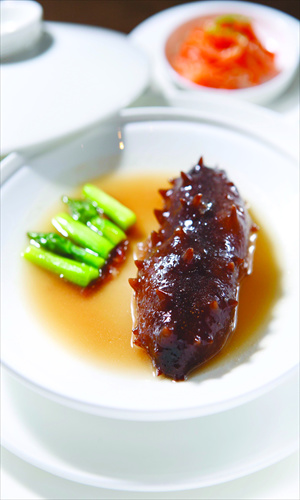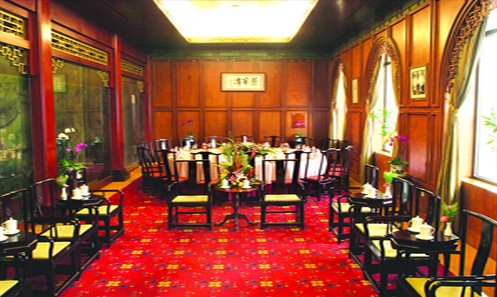


From top: the Beijing Hotel, the signature sea cucumber dish of Li's Imperial Cuisine and the interior of the Beijing Hotel dining area famous for Tanjiacai, or Tan family cuisine
Beijingers avoid window seats in restaurants, preferring to eat in private rooms in the back. Even faculty cafeterias at universities or state-run newspapers have private rooms for elite dining.
As for booking a table at the most exclusive places in town - forget it. They often don't even have signs on their doors. Metropolitan interviewed politicians, businessmen, restaurant owners and even paparazzi to get the inside scoop on where Beijing's elite dine out. Some of the spots are hiding in plain sight, if you know where to look.
Behind closed doors
When Susan Baker, wife of former US Secretary of State James Baker, visited Beijing in 1991, she planned to eat at the humbly-named Li Family Cooking restaurant, hidden in a residential neighborhood near Houhai in Dongcheng district.
However, she couldn't get a reservation, though she tried up to the very last minute. In the end, she had to switch restaurants.
"That was free advertising for us, especially after the Washington Post printed that story," said Wang Shangyi, married to Li Aiyin, the fourth-generation head of the restaurant.
Li's restaurant stands as part of a hushed culture of private dining rooms that have opened up throughout the capital, often behind plain, unmarked doors. Some of the restaurants, like Li's, have been actively courting the wider public, but others choose to remain exclusive, and their reputation spreads solely by word of mouth.
Li's restaurant sits quietly between private homes in Yangfang Hutong, with only a simple sign on the door. Although the owners translate the name of their restaurant into English as Li's Imperial Cuisine, the interior maintains the homey feeling of the Chinese name, with a traditional square courtyard and rooms furnished with wooden tables and chairs.
The family-run establishment depends on word of mouth for new customers. Despite or perhaps because of this, it has drawn a pool of high-end clients, from foreign ambassadors to businessman David Rockefeller, sports idol Muhammad Ali and the last emperor Puyi himself.
Li Aiyin's great-grandfather served as an imperial chamberlain, responsible for overseeing security issues and the imperial kitchen that served Empress Dowager Cixi, who ruled over the last days of imperial China.
At that time, each meal Cixi ate had more than 100 luxurious dishes and combined the best foods from the Han and Manchurian ethnic groups, as well as other minorities. The recipes for the cuisine stayed strictly inside the imperial court and were hard for ordinary families to enjoy, Wang said.
When Cixi passed away in 1908, Li's great-grandfather retired, bringing with him the secret recipes that have stayed within the family since.
"For years, only the Li family knew how to cook such meals and we would cook when there were weddings and funerals. It wasn't open to the public," Li recalled. It wasn't until the establishment of the restaurant in 1985 that the public got a taste of what the ancient emperors used to eat, Wang added.
The restaurant has recently opened up more than ever, offering set meals starting at 298 yuan ($48) per person, though prices certainly go up from there, topping out at 2,608 yuan a head.
Wang declined to reveal any of his family's recipes, such as their signature steamed sea cucumber, saying that even though the restaurant is open to public, the recipes stay secret within the family.
Members only
How exclusive is the Beijing Hong Kong Jockey Club? Exclusive enough to be the first choice for a British gentleman to hold the 40th anniversary celebration of his firm's ties to the central government. The man, who asked not to be named in the press, had personally negotiated with China's top leaders to import badly needed metals and other commodities into the country starting in 1972. Over the next four decades, he led his firm to closer ties with the government as their business together grew. He personally came to Beijing to make sure the arrangements would be satisfactory.
Clutching his jade dragon head-topped cane, he said that he had taken a look at the facilities earlier in the day, and found them excellent. After the inspection, he told the staff he was hungry and wished to have lunch. They politely refused to feed him, he said, pointing out that he was not a member.
The club, located at the foot of Wangfujing and steps away from the Forbidden City, refused to open its doors for the Metropolitan reporter to see what makes it so special.
"Coming into our sixth year of operation, the clubhouse is now becoming more private and exclusive to our members. Since we are not open to the public, we choose to be low-key," said a club spokesperson. Membership costs 275,000 yuan plus a monthly fee of 1,500 yuan. That gets you access to the Jockey Club complex, which looks like an oversized courtyard home made with marble and glass, mixing minimalist modernism with traditional Chinese architectural details.
The similarly exclusive Beijing Capital Club, located just north of the Sanlitun embassy district, also refused an interview request from Metropolitan. The club boasts on its website that its members include more than 1,000 of Beijing's top international and local business leaders and dignitaries. But amid the current crackdown on excessive spending by government officials, its spokesperson was less keen about touting the club's luxurious atmosphere and exclusive membership.
"Right now there are some sensitive things about exclusive clubs," she said. "I hope you understand."

Copyright ©1999-2011 Chinanews.com. All rights reserved.
Reproduction in whole or in part without permission is prohibited.